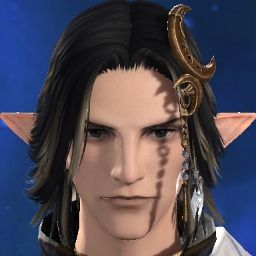Regardless of their reasoning, I'll forever be salty we were robbed of garlemald expansion. I just find it strange that Yoshi-p, who proclaimed himself as matsuno's fanboy, decided not to do any war stories because...They sort of fail on writing SB? So instead of learning from their mistake, they opt to not do it at all; and that's my biggest problem with them.
Ishikawa seems confident enough to write one or two more expansions (where one of it would be garlemald focused) before meteion reveal. It's truly unfortunate Yoshi-p we're against it. Heck, garlemald expansion doesn't even have to be a war centric. Maybe it could be a political story with spy flavour. Imagine if we have to infiltrate garlemald to look for fandaniel and zenos, while at the same time working with populates.
-
10-31-2022 06:04 PM #7231(4)
-
10-31-2022 09:25 PM #7232
At this point, I'm just really hoping they'll opt to go to Ilsabard in 7.x and cover some of the plot threads from the scrapped expansion there.
I'd very much like to see if perhaps some of the provinces have actually flourished under the Garlean occupation due to being ruled by a legatus who isn't a racist scumbag as opposed to more of the usual oppression.(2)
-
11-02-2022 02:54 AM #7233
As many people in this thread will be unsubbing or have already done so, here is a discord server if someone wishes to keep in touch.
https://discord.gg/9UtBdHjKkH(3)
-
11-07-2022 11:32 AM #7234Player

- Join Date
- Jul 2015
- Posts
- 1,259
- Character
- Ashe Sinclair
- World
- Phoenix
- Main Class
- Thaumaturge Lv 60
Sorry for the delayed reply (to the thread in general) - life has been very fun, if you catch my drift.
That's more or less the question I was posing - were the writers insecure? Perhaps as you say, they had intended to "lighten" (no pun intended... or maybe a little bit) him up all along. It's very possible. I couldn't make up my mind, honestly, which is why I was interested in others' opinions. Perhaps they really captured lightning in a bottle with Emet in ShB, and his subsequent characterisation was just more of what we usually get. But they do show they've really got in them on occasion to deliver great, nuanced characters and a gripping story - 3.0 and Pandaemonium in particular say hello - and Endwalker to me was such a let down compared to all the other expansion packs that it seemed more the exception rather than the rule, even if Emet and Amaurot were unusually spectacular high notes. Even Stormblood, which lags behind in public opinion, didn't necessarily feel out of place or struggle with bland, Disneyfied writing - it was more an issue of an identity crisis where it stretched itself too thinly in too many places. There's an identifiable thread running through the other games that connects them in terms of the tone of the plot's writing that just seemed to abruptly end with Endwalker (hah), and the reason for that being their trying to deliver a big, fan-pleasing finale to match what came before with ShB and believing the best way of achieving that was by playing it safe made the most sense, to my mind.
I'd forgotten about that line in Ultima Thule though - I think somewhere along the line I've unconsciously chosen to block that part out. What was it he said, exactly?
That's a very good point, and one I hadn't considered. They may have believed a military/ war-themed expansion would have been received poorly and went with what worked previously - i.e. a more fantasy-leaning direction. But the irony is that the Garlemald section was probably one of the best parts of EW, and after playing it I imagine such an EP would have played out more like HW than SB, which is far from a bad thing. Another thing that gives me cause to doubt that is I really would have thought they'd jump at the chance to flesh out the lore surrounding Emet's time in that region - given his popularity, it felt like an easy way to rope the fans into the story, but instead we really hear and see very little about any of it, even when it seems they established several starting points to explore. Why? Hmm.(7)Last edited by Lunaxia; 11-07-2022 at 11:44 AM.
-
11-07-2022 11:49 AM #7235Player

- Join Date
- Oct 2017
- Location
- Bozja
- Posts
- 2,580
- Character
- Harun Asubra
- World
- Zodiark
- Main Class
- Warrior Lv 100
It's the part where he and Hythlo leave after you tug at Meteion's heartstrings. Something along the lines of
Again, what I felt at the time (even as someone who likes Emet Selch and understands there's more to him than the actions he's done), and taking it from the viewpoint you presented, it didn't feel like a benevolent farewell. While to many people it just seems like he's stubborn about wanting to bring everyone back, to some, especially to players whose native places were destroyed due to his machinations, it comes off as rather insensitive. Almost like he's saying "Yeah, I don't care if I knowingly and willingly caused mass murders a hundred times over. I'm still feeling justified in my actions.""But more than that [having to live by Hydaelyn's design], the future you seek is not the past we loved. That is why we fought. And why I lost. But though you defeated me, my ideals are inviolate. Invincible."
Because keep in mind that one of his most famous spiels is him saying that he does not view us as truly alive. Therefore he cannot be convicted for murder. This is one of his ideals, which he claims are inviolate and that we have not changed his mind on.
While it's great that he holds us with some respect, and is benevolent enough to appear before us and urge us to explore Hydaelyn's world as he once did, it still comes off a bit "oof". Because in the middle of his ideals comes his primary justification to continue taking lives. And it's simply brushed off as "oh that silly Emet, still evil >w>".
However, that's my interpretation of his line. I don't remember if there's any other that would fit better, but as far as I can remember, that's the one that struck me the most. I was like "What do you mean you still feel justified? Dude, you murdered a bunch of people just for a chance to have your own back! Don't you have anything to say for that? We're just expected to believe you're the Kingdom Hearts villain-is-a-good-guy-now because of how you're behaving?". Because actions speak louder than words, and he did commit atrocities for which he apparently still feels the justification holds! Those were actions too, with far dire consequences than him telling us "I don't like it, but at least I concede defeat"... BUT I understand if other people have a different reading of that. Perhaps I'm looking too much into it, and I won't deny if people see differently.
Otherwise, yes, from your perspective and based on how I saw parts of the story, it did feel like the authors were insecure. But that was my interpretation of less positive parts of the story, and it's from the lens of a perspective that I obviously don't know whether it's true or not. Could just be the authors just thought that was fine? :| who knows(1)Last edited by Midareyukki; 11-07-2022 at 11:53 AM.
-
11-07-2022 12:38 PM #7236
The fact that this thread is still going after all these months makes me real sad for the writers. Endwalker wasn’t perfect but this thread feels like a contrarian circlejerk. Oh well. I loved it. I’ll always have fond memories of playing through it for the first time. I’ll never forget the final solo duty. Completey unexpected, it blew my mind. What a rush that was. I loved endwalker
(4)
-
11-07-2022 12:51 PM #7237Player

- Join Date
- Dec 2013
- Location
- Azeroth
- Posts
- 1,260
- Character
- Crowe Valtyr
- World
- Balmung
- Main Class
- Gunbreaker Lv 90
If this thread makes you sad, then why bother posting in it and continuing to push it to the front page?
Good for you if you enjoyed it. Genuinely, I'm happy for people who can still enjoy the game in some way. But just because you enjoyed it doesn't mean it is free of severe problems, nor does it negate the disappointment and frustration many felt when playing through it or thinking on it after the 'magic' wore off.
Never going to understand those who feel the need to say "yeah well I loved it!" as if that somehow invalidates nearly 730 pages of discussion and critique on why it was not good for a lot of people. Go enjoy it then, if you loved it. None of us are stopping you. Only asking to not have our disappointment, frustration, and annoyance swept under the rug just because X forum poster totally loved it and thought it was the most amazing story ever and competes with classic literature in its awesomeness.
-
11-07-2022 01:10 PM #7238Player

- Join Date
- Jul 2015
- Posts
- 1,259
- Character
- Ashe Sinclair
- World
- Phoenix
- Main Class
- Thaumaturge Lv 60
I had to go back and rewatch it upon you reminding me, and the whole scene was as staggeringly awful as I remember (damn it, Midare, I'd almost managed to forget that "I bid them remember, but I'm the one who forgot!" line!) Apologies to the people who enjoyed it and found it moving, but good god, the entire scene was Emet's characterisation bouncing around the scene like a yo-yo so the writers could make use of his popularity and make him their mouthpiece. The almost gentle chiding of the woman who caused him to suffer absolute misery, the lighthearted buddy cop show banter between him and Hyth during the supposed emotional highlight of the entire series when everything they've fought and sacrificed for is at stake, those endless godforsaken theatre kid puns that should have died with Emet's Garlean facade and the subtle justifications for the nebulous story, claiming mortals had fared better than anything they could have achieved...
But to focus on that line in particular, because it is the most interesting - I do distinctly remember feeling very ??? upon hearing it, because I wasn't actually sure what the writers were trying to get at with it either. The first part, I actually really like as a stand alone quote - it feels very much like the Emet we defeated at the end of ShB, and the poignancy of that "and why I lost" line is beautifully heart-breaking, as if he's admitting aloud for the first time what we knew, but he had never allowed himself to think - that his heart had gone from the fight, and he had lost the will to continue. They could have ended it there.
But the ideals part baffles me. What ideals? Did Emet have ideals? I thought he was painted as a "by any means necessary" kind of guy adhering to his duty who had little regard for principles, morals, notions of good and evil - he frequently resented being seen as a villain, and seemed to view to everything through the lens of "is this useful to me?" rather than anything else. His ideals that the Ancients were superior? That the world should have been rejoined? As you say, were they genuinely trying to shoehorn in a quick "I don't regret any of the suffering I caused" in the same moment they were trying to make him a grudging protagonist?
The kindest interpretation I can give is him referring to his sense of duty to his people, meaning he would always have done whatever he could to save them, and that he still believed the past world was a better place... which isn't much better, but a little less of a spit-in-your-eye goodbye, I guess.(6)
-
11-07-2022 01:22 PM #7239Player

- Join Date
- Oct 2017
- Location
- Bozja
- Posts
- 2,580
- Character
- Harun Asubra
- World
- Zodiark
- Main Class
- Warrior Lv 100
:| I liked the story. I just know that there were less successful parts and parts that rubbed me the wrong way. And as many people have told me before, people are allowed to post their opinions on the forums. Keep in mind that both of my latest replies always make sure to point out that it's both hypothetical, personal and that it's possible reality wouldn't match. I was just entertaining someone else's perspective, which happened to agree with some of the takes I, personally, got from the story.
And it's fine to enjoy the story. I'm sure there was another thread lurking around that was dedicated to praising it. Yet you don't see it being touted half as much. I wonder why... Still. The most obvious vitriolic answer is "because the forums love to complain and be negative, so all positivity is buried". And I got no good answer to that, I'm not the entirety of the forums, and I did try to make positive posts before.
Some people were frustrated at parts of the story that I wasn't. And some stuff I shine a more negative light because of how I personally interpreted a certain scene or two. But upon revisiting them, I start to understand why some people interpreted them as neutral or even positive. I won't shy away from criticising my own views. Emet Selch's quote that I posted doesn't need to be met with a negative outlook. Nuances of writing are hard to iron out, and there's only so much anyone can say. He's not real for us to ask him any further questions, nor are we playing a game where we were given such a luxury. Meaning you can interpret what Emet said differently than me. And at least I can agree that I might be looking into things a bit too much.
Ex falso quodlibet. The moment you have a false premiss, you can come up with anything. That's my stance on my last two entries.
I won't deny that some people are more negative than I might be, nor that I myself haven't posted that much here that could be met as positive. But, two things:
1 - I don't have to judge those people, nor do I have to judge you for being any more positive/negative than me.
2 - As many people love to point out, the forums are barely 1% of the playerbase. And overall, Endwalker was very well received. The only lamentable thing about this thread might just be that it's on the official platform. That's all.
But it's because of those two things that reacting to things with "Ugh, circlejerk, poor writers" is you doing the exact opposite face of the coin of what you complain.
It's good that people enjoy this story. At best we have people who want it to be improved upon, at worst we have people who just don't enjoy it anymore. All three are valid. If I think the writers got insecure at some point in the process, I'm not pointing fingers. I'd like them to be more comfortable with what they got, and wonder why that would be. I'm not out for their blood and hey... as English speakers say, "everyone's a critic".
and hey... as English speakers say, "everyone's a critic".
I think so, at least from how he put it in Elpis and the rest. "By any means necessary" was just his method. A way to achieve his ideal. Which is the interesting part in Elpis, knowing that he wasn't a murder hobo before and held life in great esteem. When he got Tempered, that got warped, and so too did his ideal. Which is what rubbed me wrong at Ultima Thule.
"My ideals are inviolate, you didn't change them" made me feel like he was still clinging onto his latter ideals than the ones we discussed at Elpis. That he'd do it all over again given the chance. And "it" implied killing a bunch of people, which his elder self was disgusted by.
:x If that was the case, then I agree it was clumsy. On the virtue that there were better-executed references to songs in the game. Stuff that people quickly spotted. Usually lyrics. Good catch though Kazhar xD I only ever think of "Who Brings Shadow", so that completely went over my head!(2)Last edited by Midareyukki; 11-07-2022 at 01:38 PM.
-
11-07-2022 01:34 PM #7240
I believe the "ideals" quote was just so they could make a clumsy reference to his battle theme ("Invincible"), just like the entire ten years saga was jeopardized by the probably late decision to make it fit Answers's lyrics.
This is after all, the same scene where Emet-Selch was blatantly used as a living advertisement for future content, their focus wasn't on writing a compelling closure for his character.(7)Last edited by Kazhar; 11-07-2022 at 01:38 PM.




 Reply With Quote
Reply With Quote















